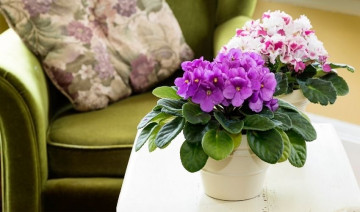
Caring for Flowering Houseplants
Flowering houseplants can bring a delightful burst of color to any room, but what if your houseplants don’t bloom well? Caring for flowering houseplants properly is essential to nurture abundant blooms so you have weeks of stunning color to enjoy.
Top Flowering Houseplants
There are many beautiful flowering houseplants to choose from, and each one has different colors, textures, and bloom habits to bring to your home. The most popular blooming houseplants include…
- African violets
- Amaryllis
- Anthuriums
- Begonias
- Bromeliads
- Chenille plants
- Christmas cacti
- Crown of thorns
- Cyclamens
- Geraniums
- Guppy plants
- Ixoras
- Jasmines
- Kaffir lilies
- Kalanchoes
- Orchids
- Peace lilies
- Shrimp plants
These are just a few of the top flowering houseplants – check with your local nursery for new options and unique cultivars. When choosing a plant for its blooms, however, be sure it will thrive in your home’s conditions. Some plants can be more challenging to bring into bloom, while others are happy with minimal care. Research different plants’ bloom seasons, reblooming habits, colors, mature sizes, and other characteristics to be sure you choose a plant you will love and that will be happy in your home.
Tips to Care for Flowering Houseplants
The best care will bring about the best blooms on every flowering houseplant. If you have a specific plant, research its ideal care regimen and strive to provide it with the healthiest, most nurturing environment for the lushest blooms. For all flowering houseplants…
- Choose Healthy Plants
Purchase flowering houseplants from reputable dealers and good quality nurseries and garden centers to ensure they are healthy and in the best condition. This will help the plants adapt to changes in your home more easily so they can bloom well. Inspect the plants for pests and stress, and avoid plants that show signs of weakness, poor growth, or illness.
- Provide a Proper Pot
A comfortable pot will help a plant bloom more profusely. Some houseplants prefer roomier accommodations, while others need a cozy pot to encourage extra flowering. The pot should have good drainage to minimize the risk of root rot or overwatering.
- Use the Best Potting Mix
A specialized potting mix with proper organic material will best support flowering houseplants. Some plants, such as orchids, cacti, or succulents, require different mixes than other flowering houseplants, depending on their native conditions. Choose the mix to match your plants.
- Get the Best Sunlight
Flowers need sunlight for the biggest, most colorful blooms. Position flowering houseplants in south- or east-facing windows if possible, but be aware that some flowering plants can burn in direct sunlight and filtered light may be best. Supplemental lights can also help if needed.
- Rotate Plants
Rotate all houseplants, including flowering ones, regularly to encourage straight, upright, even growth. This will also ensure the plant flowers on all sides and does not develop a lopsided look. As the seasons change, you may also want to move the plant to sunnier spots.
- Water Appropriately
As with all houseplants, overwatering is dangerous and can damage or kill the plant. Note how your flowering houseplants prefer to be watered, such as if they need to be watered from the base or from the top, and use fresh water without impurities to best nourish the plants.
- Improve Humidity
Because many flowering houseplants have tropical origins, they will look their best if the air around them is more humid. Bathrooms and kitchens generally have higher humidity, or using a pebble tray or humidifier can improve the humidity around the plants.
- Feed Nutritiously
For the brightest, most frequent blooms, flowering houseplants will need regular feeding. Take care not to overfeed the plants, however, or they may burn or become overgrown. Regular but light feeding is best to give proper nutrition to flowering houseplants.
- Keep the Temperature in Range
Many plants need a cooler period at night or in the winter to encourage proper flowering. Be sure your plants are kept in the right temperature range not just during the day, but throughout the seasons as well so they will bloom their best.
- Remove Faded Flowers
As blooms fade, pinching them off at the base of the stem will keep the plant neat and in a tidy compact shape. Removing faded blooms can also encourage additional flowering and extend the blooming season so you can enjoy flowers for a longer period.
It can take experimentation and adjustment to find the perfect conditions for your flowering houseplants to nurture them for optimum blooming. Because some plants can be finicky, take care with making adjustments and be patient with the plants, and you will eventually be rewarded with stunning blooms that bring nature’s most brilliant colors right into your home.
